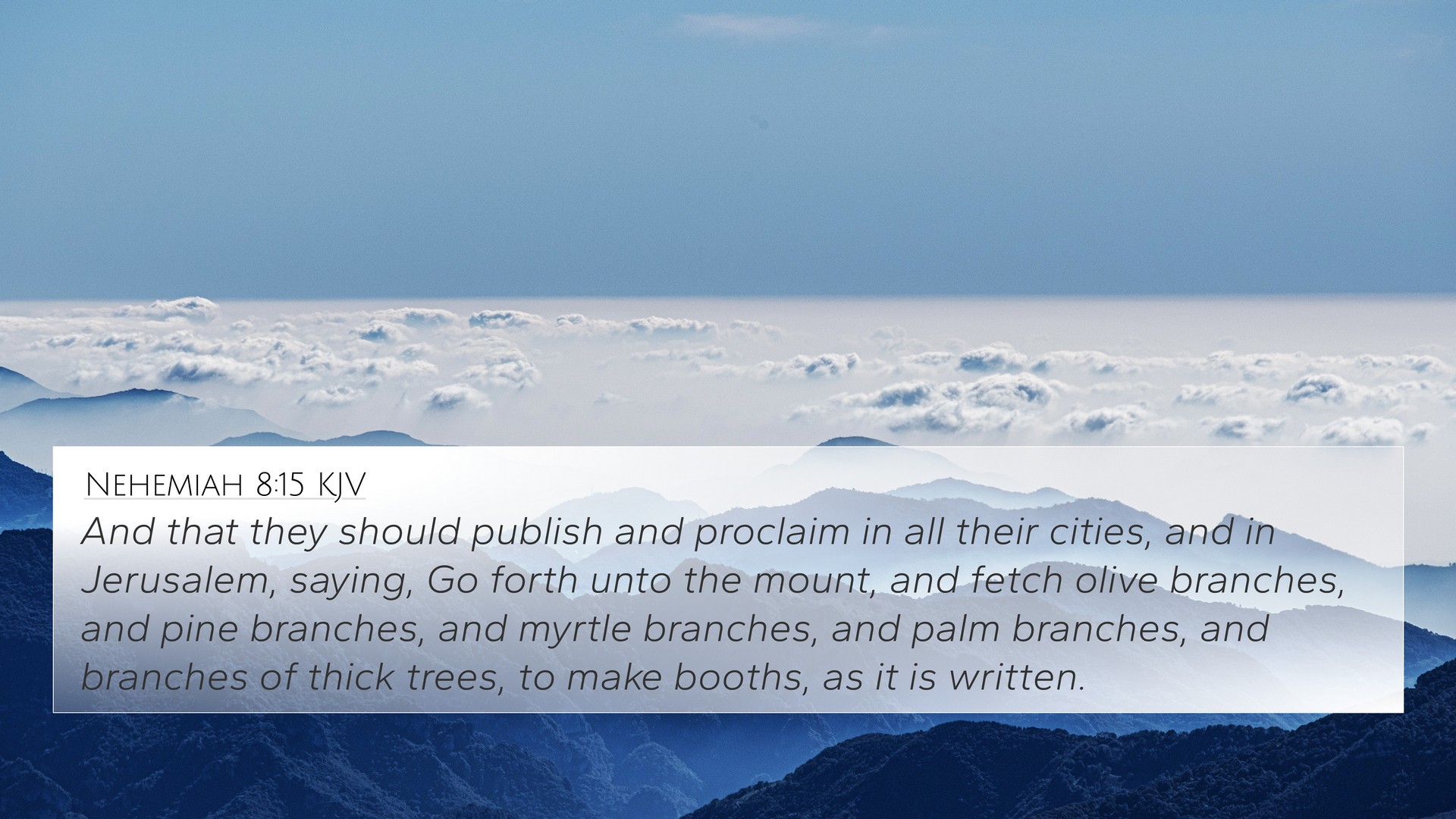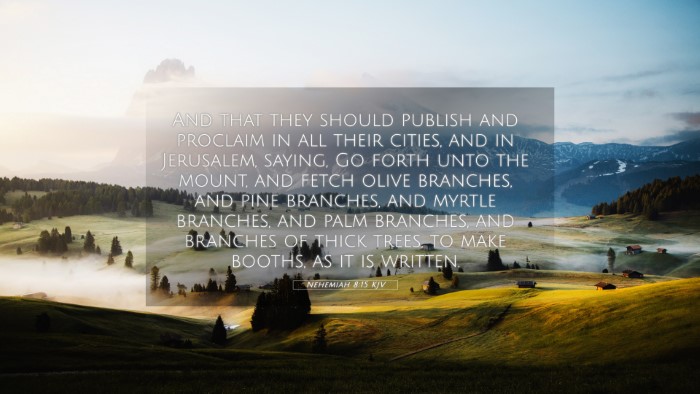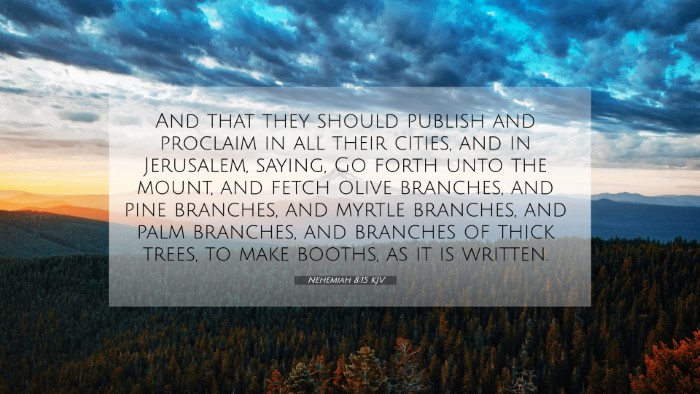Old Testament
Genesis Exodus Leviticus Numbers Deuteronomy Joshua Judges Ruth 1 Samuel 2 Samuel 1 Kings 2 Kings 1 Chronicles 2 Chronicles Ezra Nehemiah Esther Job Psalms Proverbs Ecclesiastes Song of Solomon Isaiah Jeremiah Lamentations Ezekiel Daniel Hosea Joel Amos Obadiah Jonah Micah Nahum Habakkuk Zephaniah Haggai Zechariah MalachiNehemiah 8:15 Similar Verses
Nehemiah 8:15 Cross References
And that they should publish and proclaim in all their cities, and in Jerusalem, saying, Go forth unto the mount, and fetch olive branches, and pine branches, and myrtle branches, and palm branches, and branches of thick trees, to make booths, as it is written.
Uncover the Rich Themes and Topics of This Bible Verse
Listed below are the Bible themes associated with Nehemiah 8:15. We invite you to explore each theme to gain deeper insights into the Scriptures.
Nehemiah 8:15 Cross Reference Verses
This section features a detailed cross-reference designed to enrich your understanding of the Scriptures. Below, you will find carefully selected verses that echo the themes and teachings related to Nehemiah 8:15 KJV. Click on any image to explore detailed analyses of related Bible verses and uncover deeper theological insights.

Leviticus 23:40 (KJV) »
And ye shall take you on the first day the boughs of goodly trees, branches of palm trees, and the boughs of thick trees, and willows of the brook; and ye shall rejoice before the LORD your God seven days.
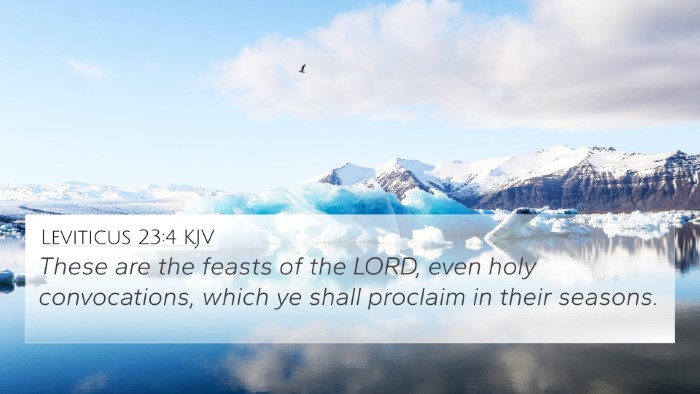
Leviticus 23:4 (KJV) »
These are the feasts of the LORD, even holy convocations, which ye shall proclaim in their seasons.
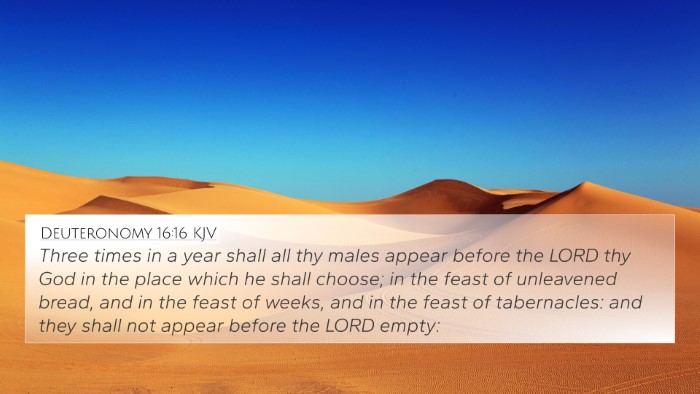
Deuteronomy 16:16 (KJV) »
Three times in a year shall all thy males appear before the LORD thy God in the place which he shall choose; in the feast of unleavened bread, and in the feast of weeks, and in the feast of tabernacles: and they shall not appear before the LORD empty:
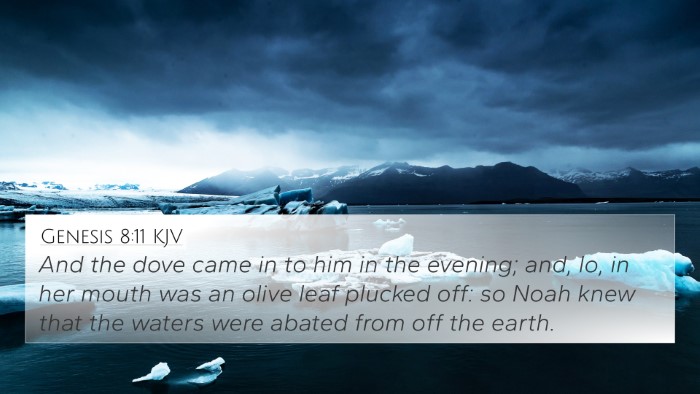
Genesis 8:11 (KJV) »
And the dove came in to him in the evening; and, lo, in her mouth was an olive leaf plucked off: so Noah knew that the waters were abated from off the earth.

Judges 9:48 (KJV) »
And Abimelech gat him up to mount Zalmon, he and all the people that were with him; and Abimelech took an axe in his hand, and cut down a bough from the trees, and took it, and laid it on his shoulder, and said unto the people that were with him, What ye have seen me do, make haste, and do as I have done.
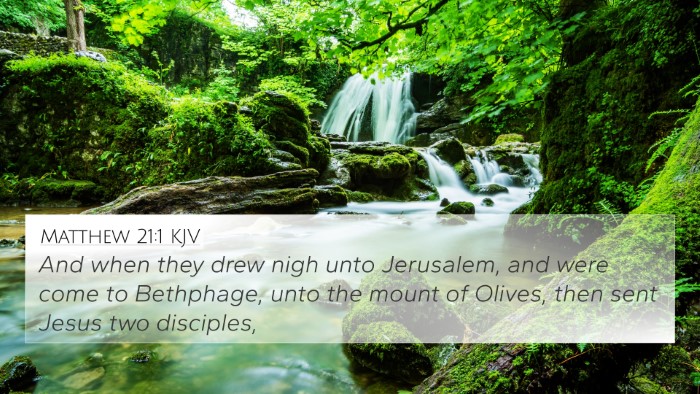
Matthew 21:1 (KJV) »
And when they drew nigh unto Jerusalem, and were come to Bethphage, unto the mount of Olives, then sent Jesus two disciples,
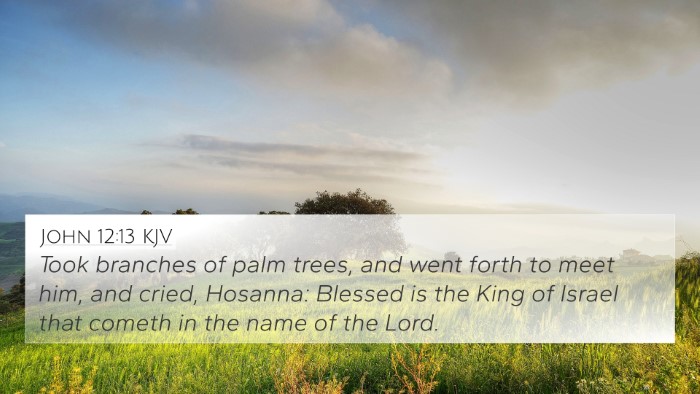
John 12:13 (KJV) »
Took branches of palm trees, and went forth to meet him, and cried, Hosanna: Blessed is the King of Israel that cometh in the name of the Lord.
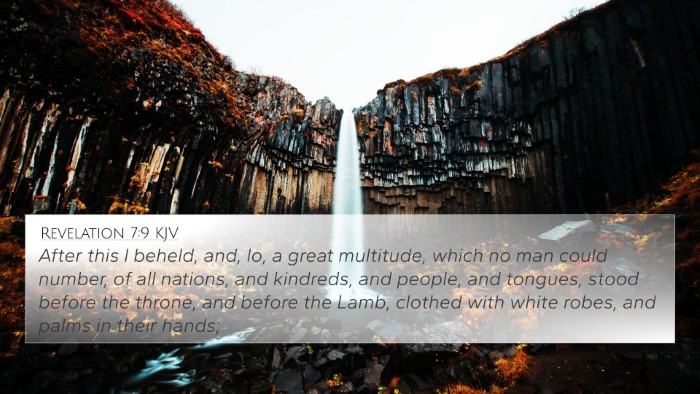
Revelation 7:9 (KJV) »
After this I beheld, and, lo, a great multitude, which no man could number, of all nations, and kindreds, and people, and tongues, stood before the throne, and before the Lamb, clothed with white robes, and palms in their hands;
Nehemiah 8:15 Verse Analysis and Similar Verses
Understanding Nehemiah 8:15
Bible Verse: Nehemiah 8:15 - "And that they should publish and proclaim in all their cities and in Jerusalem, saying, Go forth unto the mount, and fetch olive branches, and pine branches, and myrtle branches, and palm branches, and branches of thick trees, to make booths, as it is written."
Verse Meaning and Context
Nehemiah 8:15 occurs during an important moment in the history of Israel. In this chapter, the people have gathered to hear the Law read after their return from Babylonian exile. The verse instructs them on the celebration of the Feast of Tabernacles (Sukkot), a festival that remembers the Israelites' journey in the wilderness and celebrates God's provision.
Commentary Insights
Matthew Henry's Commentary: Matthew Henry emphasizes the significance of obedience to God's commandments. The gathering reflects a renewed commitment among the Israelites to celebrate the feasts as prescribed in the Law. The gathering was an awakening of their spiritual identity and recognition of their covenant relationship with God.
Albert Barnes' Notes: Barnes points out that the instruction to "fetch olive branches, and pine branches" shows the variety and abundance of nature's offerings that should be used to create temporary shelters. This act symbolizes gratitude for God's bountiful provision and protection during their wilderness journey.
Adam Clarke's Commentary: Clarke elaborates that each type of branch mentioned carries its unique symbolism. The palm branches, for example, symbolize victory and joy, while the myrtle branches represent peace and prosperity. This multifaceted use of nature's elements enriches the observance and reflects the diversity of God's creation.
Bible Verse Cross-References
- Leviticus 23:40: "And ye shall take you on the first day the boughs of goodly trees, branches of palm trees, and the boughs of thick trees, and willows of the brook; and ye shall rejoice before the Lord your God seven days."
- Deuteronomy 16:14: "And thou shalt rejoice in thy feast, thou, and thy son, and thy daughter, and thy manservant, and thy maidservant, and the Levite, the stranger, and the fatherless, and the widow, that are within thy gates."
- Psalm 118:27: "God is the Lord, which hath shewed us light: bind the sacrifice with cords, even unto the horns of the altar."
- Zachariah 14:16: "And it shall come to pass, that every one that is left of all the nations which came against Jerusalem shall even go up from year to year to worship the King, the Lord of hosts, and to keep the feast of tabernacles."
- John 7:2: "Now the Jews' feast of tabernacles was at hand."
- 1 Kings 8:65: "And at that time Solomon held a feast, and all Israel with him, a great congregation, from the entering in of Hamath unto the river of Egypt, before the Lord our God, seven days and seven days, even fourteen days."
- Nehemiah 8:17: "And all the congregation of them that were come again out of the captivity made booths, and sat under the booths: for since the days of Jeshua the son of Nun unto that day had not the children of Israel done so. And there was very great gladness."
Thematic Connections
Nehemiah 8:15 serves as an excellent example of the thematic connections present throughout the Bible. The call to celebrate the Feast of Tabernacles highlights several significant concepts, including:
- Remembrance: The Israelites recall their history and God's faithfulness during their times of trouble.
- Unity: The gathering emphasizes the communal aspect of worship and shared experience among the people.
- Gratitude: A time to appreciate God's provision and blessings through tangible symbols such as branches from trees.
- Obedience: The narrative is a reminder of the importance of following God's commands as a measure of faithfulness.
- Celebration: A call to rejoice and inhabit the joy that comes from restoration and God's provision.
Using Cross-References for Deeper Understanding
Exploring connections between Bible verses enhances our understanding of scripture. Here are some tools and techniques for effective cross-referencing:
- Bible Concordance: Utilizing a concordance helps locate key words and themes across the Bible, revealing connections between verses.
- Bible Cross-Reference Guide: A structured guide that categorizes verses based on themes and subjects allows for focused study.
- Cross-Reference Bible Study: Engage in studying related verses to uncover deeper meanings and applications of particular scriptures.
Cross-referencing enables believers to uncover connections between the Old and New Testament, identify biblical themes, and deepen their understanding of scriptural teachings. For instance, by examining Nehemiah 8:15 in light of the Feast of Tabernacles' significance in Leviticus 23, we see how long-standing traditions inform worship practices in both the Old and New Testament.
Conclusion
Nehemiah 8:15 invites readers into a rich tapestry of biblical history, cultural traditions, and spiritual significance. As modern interpreters, engaging with cross-references illuminates our understanding of God's continual presence and provision throughout the holy narratives, revealing the profound relationships between verses and themes throughout Scripture.
